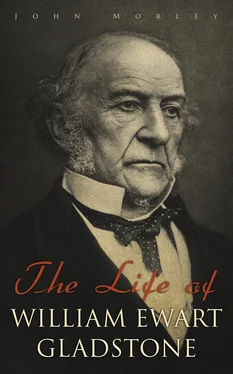On one important element in the complex Italian case at this time, Mr. Gladstone gained a clear view.
Some things I have learned in Italy, he wrote to Manning ( January 26, 1851 ), that I did not know before, one in particular. The temporal power of the pope, that great, wonderful, and ancient erection, is gone . The problem has been worked out—the ground is mined—the train is laid—a foreign force, in its nature transitory, alone stays the hand of those who would complete the process by applying the match. This seems, rather than is, a digression. When that event comes, it will bring about a great shifting of parts—much super-and much subter-position. God grant it may be for good. I desire it, because I see plainly that justice requires it. Not out of malice to the popedom; for I cannot at this moment dare to answer with a confident affirmative, the question, a very solemn one—Ten, twenty, fifty years hence, will there be any other body in western Christendom witnessing for fixed dogmatic truth? With all my heart I wish it well (though perhaps not wholly what the consistory might think agreed with the meaning of the term)—it would be to me a joyous day in which I should see it really doing well.
Various ideas of this kind set him to work on the large and curious enterprise, long since forgotten, of translating Farini's volumes on the Roman State from 1815 down to 1850. According to the entries in his diary he began and finished the translation of a large portion of the book at Naples in 1850—dictating and writing almost daily. Three of the four volumes of this English translation were done with extraordinary speed by Mr. Gladstone's own hand, and the fourth was done under his direction. 254His object was, without any reference to Italian unity, to give an illustration of the actual working of the temporal power in its latest history. It is easy to understand how the theme fitted in with the widest topics of his life; the nature of theocratic government; the possibility (to borrow Cavour's famous phrase) of a free church in a free state; and above all,—as he says to Manning now, and said to all the world twenty years later in the day of the Vatican decrees,—the mischiefs done to the cause of what he took for saving truth by evil-doing in the heart and centre of the most powerful of all the churches. His translation of Farini, followed by his article on the same subject in the Edinburgh in 1852, was his first blast against 'the covetous, domineering, implacable policy represented in the term Ultramontanism; the winding up higher and higher, tighter and tighter, of the hierarchical spirit, in total disregard of those elements by which it ought to be checked and balanced; and an unceasing, covert, smouldering war against human freedom, even in its most modest and retiring forms of private life and of the individual conscience.' With an energy not unworthy of Burke at his fiercest, he denounces the fallen and impotent regality of the popes as temporal sovereigns. 'A monarchy sustained by foreign armies, smitten with the curse of social barrenness, unable to strike root downward or bear fruit upward, the sun, the air, the rain soliciting in vain its sapless and rotten boughs—such a monarchy, even were it not a monarchy of priests, and tenfold more because it is one, stands out a foul blot upon the face of creation, an offence to Christendom and to mankind.' 255As we shall soon see, he was just as wrathful, just as impassioned and as eloquent, when, in a memorable case in his own country, the temporal power bethought itself of a bill for meddling with the rights of a Roman voluntary church.
241.For the two Letters to Lord Aberdeen , see Gleanings , iv.
242.There was a slight discrepancy between the two on this point, Mr. Gladstone describing the position as above, Aberdeen believing that it was by his persuasion that Mr. Gladstone dropped his intention of instant publicity. Probably the latter used such urgent language about an appeal to the public opinion of England and Europe, that Lord Aberdeen supposed it to be an immediate and not an ulterior resort. Aberdeen to Castelcicala, September 15, 1851, and Mr. Gladstone to Aberdeen, October 3.
243.The mere announcement caused such a demand that a second edition was required almost before the first was published.
244. Wesleyan Methodist Magazine , October 1851. Protestant Magazine , September 1851.
245.Gladstone to Lord Aberdeen, September 16, 1851.
246.Mr. Gladstone in an undated draft letter to Castelcicala.
247.The one point on which Lord Aberdeen had a right to complain was that Mr. Gladstone did not take his advice. As the point revives in Lord Stanmore's excellent life of his father, it may be worth while to reproduce two further passages from Mr. Gladstone's letter to Lord Aberdeen of July 7, 1851. Before publishing the second of the two Letters, he wrote to Lord Aberdeen: 'I ought perhaps to have asked your formal permission for the act of publication; but I thought that I distinctly inferred it from a recent conversation with you as to the mode of proceeding '—(Mr. Gladstone to Lord Aberdeen, July 7, 1851). Then he proceeds as to the new supplementary publication: 'If it be disagreeable to you in any manner to be the recipient of such sad communications, or if you think it better for any other reason, I would put the further matter into another form.' In answer to this, Lord Aberdeen seems not to have done any more to refuse leave to associate his name with the second Letter, than he had done to withdraw the assumed leave for the association of his name with the first.
248.Ashley, Palmerston , ii. p. 179.
249.August 7, 1851. Hansard , cxv. p. 1949.
250.Fagan's Life of Panizzi , ii. pp. 102-3.
251.On the share of Mr. Gladstone's Letters in leading indirectly to this decision, see the address of Baldacchini, Della Vita e de' Tempi di Carlo Poerio (1867), p. 58.
252. Gleanings , iv. pp. 188, 195. Trans. of Farini, pref. p. ix.
253.To Dr. Errera, author of A Life of Manin , Sept. 28, 1872. For Manin's account, see his Life , by Henri Martin, p. 377.
254.The first two volumes were published by Mr. Murray in 1852, and the last two in 1854. ' June 17, 1851 .—Got my first copies of Farini. Sent No. 1 to the Prince; and wrote with sad feelings in those for Hope and Manning.'— Diary .
255. Gleanings , iv. pp. 160, 176.
CHAPTER VII
RELIGIOUS TORNADO—PEELITE DIFFICULTIES
( 1851-1852 )
I am always disposed to view with regret the rupture of party ties—my disposition is rather to maintain them. I confess I look, if not with suspicion, at least with disapprobation on any one who is disposed to treat party connections as matters of small importance. My opinion is that party ties closely appertain to those principles of confidence which we entertain for the House of Commons.—Gladstone (1852).
As we have seen, on the morning of his arrival from his Italian journey (February 26, 1851) Mr. Gladstone found that he was urgently required to meet Lord Stanley. Mortified by more than one repulse at the opening of the session, the whigs had resigned. The Queen sent for the protectionist leader. Stanley said that he was not then prepared to form a government, but that if other combinations failed, he would make the attempt. Lord John Russell was once more summoned to the palace, this time along with Aberdeen and Graham—the first move in a critical march towards the fated coalition between whigs and Peelites. The negotiation broke off on the No Popery bill; Lord John was committed to it, the other two strongly disapproved. The Queen next wished Aberdeen to undertake the task. Apparently not without some lingering doubts, he declined on the good ground that the House of Commons would not stand his attitude on papal aggression. 256Then according to promise Lord Stanley tried his hand. Proceedings were suspended for some days until Mr. Gladstone should be on the ground. He no sooner reached Carlton Gardens, than Lord Lincoln arrived, eager to dissuade him from accepting office. Before the discussion had gone far, the tory whip hurried in from Stanley, begging for an immediate visit.
Читать дальше









![William Frith - John Leech, His Life and Work. Vol. 1 [of 2]](/books/747171/william-frith-john-leech-his-life-and-work-vol-thumb.webp)


![William Frith - John Leech, His Life and Work, Vol. 2 [of 2]](/books/748201/william-frith-john-leech-his-life-and-work-vol-thumb.webp)